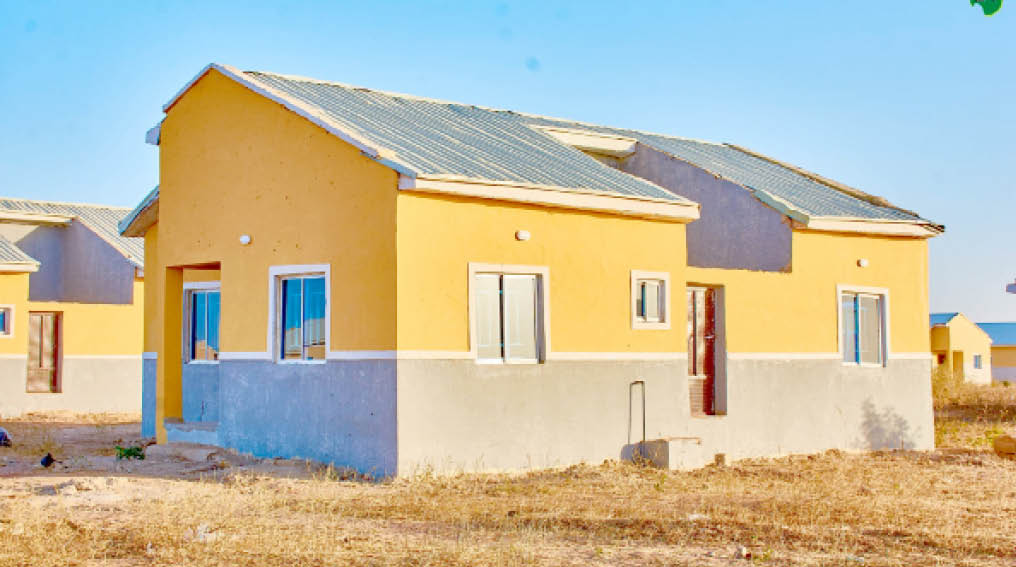In a bid to bridge the housing deficit and provide quality and affordable housing to civil servants and assist the vulnerable population, the Yobe State government in collaboration with Family Homes Funds Ltd recently delivered 2,350 housing units in the state.
The state government approved the total sum of N15, 957, 202, 322 for the construction of 2,350 housing units across the state while the Family Homes Funds Ltd Company provided financing and technical support to ensure that the houses are delivered on time and are up to standard.
Daily Trust gathered that the 2,350 houses built under the initiative are spread across the 17 local government areas.
The houses are built in two-bedroom and three-bedroom apartments. Each three-bedroom unit occupied 800 square meters of land while each two-bedroom unit is allocated 600 square meters of land.
- NIGERIA DAILY:Why You Should Never Entertain Suicidal Thoughts
- Why companies are vulnerable to cyberattacks – Expert
Data has shown that housing deficit in Nigeria has been on the rise from 12 million units in 2007 to 14 million in 2010; 20 million in 2018, and by 2023, Nigeria has an estimated 28 million housing deficit.
Daily Trust reports that the houses were built in different parts of Yobe so that all parts of the state would benefit from them.
It was gathered that 500 units were built in Yobe Zone A with Gaidam and Buni-Yadi towns each having 250 units.
In Zone B, 250 units were constructed, with 250 in Potiskum and 200 units in Damagum town of Fune Local Government Area.
In Zone C, 250 houses were constructed in Gashua town, 200 units in Nguru, and 150 units in Machina.
Our correspondent gathered that the state capital, Damaturu, has 1000 units of houses, out of which 500 were cited along Potiskum Road, 250 along Maiduguri Road, and the remaining 250 units along Gujba Road.
The housing estates comprise of two bedrooms and a sitting room, and a toilet. The apartments are of standard quality aimed at reducing civil servants’ spending, and extra-budgetary allocation on shelter.
Residents speak
Initially, residents and indigenes struggled to pay for the houses, citing the high cost which the state government had pegged it.
However, Governor Mai Mala Buni during the 2023 budget presentation to the State House of Assembly in 2022, subsidized the cost of 2,350 housing units constructed by his administration through the Family Home Funds by 50 percent.
The Yobe State Housing and Property Development Corporation had, in a schedule of payment of the 2,350 affordable houses, said those going for the ‘3 Bedroom Urban’ were to pay N5,675,540.00; those for the ‘2 Bedrooms Urban’ N4,300,050,79; while those for ‘2 Bedrooms Rural’ would pay N3,000,050.84 within 15 years.
The subsidy announcement had motivated interested buyers to apply for the houses with consideration of payment within 15 years or less.
Adamu Abdullahi Dina, a resident, told Daily Trust “I have been renting a house for 15 years, I used to pay my rent annually, and luckily, I secured an allocation from the state government when I applied for it.
“I secured the allocation for N6.8m but after the state government slashed the price by 50 percent, I will now pay N2.6m. I pay N16,000 monthly from my salary for the house at a stipulated time,” he said.
Another beneficiary, Bukar Ibrahim – a staff of the Yobe State Judiciary Commission, told Daily Trust that in the last 10 years, he has been struggling to build his own house in the city, and all his efforts have been fruitless before the establishment of the housing units.
“As the state capital, acquiring land in Damaturu is one of the most difficult things for an ordinary civil servant like me whose salary is not up to N50,000 a month, with 6 children.
“I used to pay N80,000 for rent annually before life became very difficult for me. After those houses were constructed, I followed the procedures of acquiring the house and I got one.
“In the first place, the price of the house was way beyond my salary, but I was lucky when Governor Buni announced the slash in price by 50 percent to enable the government carry out more services to the people.”
Also, Mustapha Bukar, a staff of the Yobe State Ministry of Education, told Daily Trust that the hike in house rent had become a source of concern before the construction of the 2,350 houses that provided succour to residents.
“The increase in house rent, which had doubled as a result of the influx of NGO staff who can pay rent at any cost because they have huge salaries, had put us in a difficult condition and aggravated our hardship, considering the austere socioeconomic realities.
“Many landlords preferred to give out their newly constructed houses to NGO staff because they can afford for pay. This put us in a difficult predicament.
“Low-income earners and poor families were compelled to squeeze their families into smaller rooms in some parts of Damaturu. For me, I secured this house through one of the previous permanent secretaries in our ministry. I was asked to pay N16,000 monthly for 10 years. my salary can cope with the monthly deduction and we’ll still have food on the table,” he added.
The Yobe State Chairman of PALAN, Yunusa Alhaji Hamza Bindigari, said the state, being one of the epicentres of Boko Haram, has an influx of donor agencies and development partners supporting vulnerable persons, so most of the staff of the NGOs leverage on the 2,350 houses.
“After the Boko Haram attacks which sacked many people from their houses, especially in Gujba, Geidam and Gulani LGAs, there was an influx of people to Damaturu, especially the IDPs and people from the neighbouring cities.
“This influx of people to Damaturu created a demand for the construction of new houses in the city. Many people constructed houses to sell and make profit or build and rent out, from which you can recover your capital within some years because the market is flourishing in Damaturu.
“Despite these houses, the challenge of housing deficit remained unresolved because the number of people coming into the town kept increasing by the day.
“The number of federal civil servants, Yobe State public servants, NGO workers and private sector workers moving to Damaturu increased and the demand for houses equally skyrocketed, but after the Yobe State government built these 2,350 housing units, succour has been provided to some extent. The houses have reduced the burden,” he said.

 Join Daily Trust WhatsApp Community For Quick Access To News and Happenings Around You.
Join Daily Trust WhatsApp Community For Quick Access To News and Happenings Around You.


